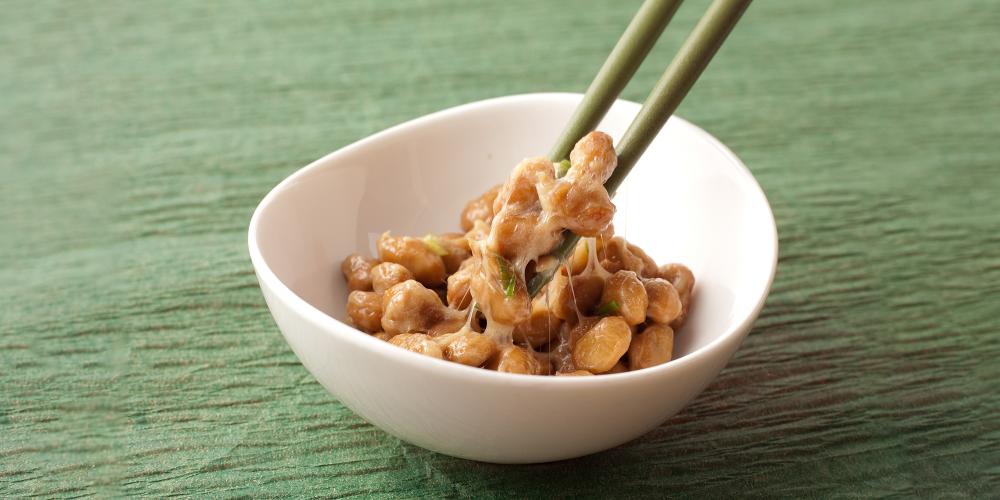
Nattokinase Supplements, Benefits & Side Effects
There appears to be evidence that taking nattokinase supplements may have benefits for the heart and for arterial health. But what exactly do nattokinase supplements do? What is nattokinase and are nattokinase supplements effective?
Nattokinase is an enzyme made by a type of probiotic that is found naturally in the gut, during the production of natto. Natto is prepared using Bacillus subtilis which is added to cooked soya beans. This mixture is left to ferment for around 24 hours to create a slippery food called natto that is a traditional Japanese food.
Many of you will have heard about the benefits of fermented foods such as yoghurt, sauerkraut, and kefir. Whilst most of the health benefits of fermented foods may be attributed to probiotics and their ability to restore a healthy microbiome, some of the health benefits may be due to the nattokinase produced during fermentation. Natto, fermented cooked soya beans, is rich in vitamins and minerals especially vitamin K2 known for its heart protective benefits.
Aside from the above fermented foods, nattokinase rich foods include miso, tempeh, and soy sauce.
The health benefits of nattokinase
The Japanese diet has been associated with healthy ageing and heart health. Natto, seaweed, and fish alongside steaming or boiling are healthy options. The incorporation of fewer processed foods, less saturated fat, and sugar all lend to protecting our heart.
Studies indicate that nattokinase supplements promote healthy blood flow, supports the body’s natural clotting mechanisms, and may maintain healthy blood pressure all of which are markers for heart health1.
One randomised controlled trial found that taking 2000 FU of nattokinase daily for eight weeks was shown to support healthy blood pressure1.
Whilst many might ask the question as to why take nattokinase supplements when you can eat natto, the truth is natto is difficult to obtain, is an acquired taste, and one would need to consider eating 50 grams or more per day to get the benefits from one nattokinase capsule.
Can you take a nattokinase supplement daily?
You can take nattokinase supplements on a daily basis. Additionally, unlike natto, which is rich in vitamin K2, nattokinase does not contain any vitamin K2 nor some of the other compounds found in soya beans. This is important for those who are already taking vitamin K2 either on its own or as part of a bone building supplement.
Should nattokinase supplements be taken on an empty stomach?
Nattokinase is a protein-degrading enzyme that is fibrinolytic which means that it promotes the breakdown of blood clots without affecting fibrinogen, the major component of a blood clot. This action means that it dissolves clots reducing the risk of bleeding complications. Due to its interaction with protein, taking nattokinase with food might result in this compound working as a protein digesting enzyme reducing its heart benefits2.
For optimal benefits, it is advisable to take nattokinase supplements an hour before any food.
Is nattokinase absorbed?
There is a misconception that nattokinase loses its potency due to the highly acidic environment of the stomach with the result that it does not provide any health benefits.
A study carried out in the USA reveals that nattokinase is acid resistant, and that this enzyme remains intact after digestion passing into the bloodstream where it provides its health benefits3.
Conclusion
Nattokinase offers multiple benefits for the body especially for the heart. Good Health Naturally Nattokinase supplement contains 2000FU of nattokinase in each capsule which is the exact strength used in the trial mentioned in this editorial. You should avoid nattokinase supplements if you are allergic to soya beans. Pregnant or nursing mothers and children should avoid nattokinase supplements. If you are over 65, and taking medications, check with your GP for their advice on taking nattokinase supplements.
References:
- Kim JY, et al. "Effects of nattokinase on blood pressure: a randomized, controlled trial." Hypertens Res. August 2008. https://pubmed.ncbi.nlm.nih.gov/18971533/
- Jamali, N., Vahedi, F., Soltani Fard, E., Taheri-Anganeh, M., Taghvimi, S., Khatami, S. H., Ghasemi, H., & Movahedpour, A. (2023). Nattokinase: Structure, applications and sources. Biocatalysis and Agricultural Biotechnology, 47, 102564. https://doi.org/10.1016/j.bcab.2022.102564
- Jensen, G., Lenninger, M., Ero, M. P., & Benson, K. (2016). Consumption of nattokinase is associated with reduced blood pressure and von Willebrand factor, a cardiovascular risk marker: results from a randomized, double-blind, placebo-controlled, multicenter North American clinical trial. Integrated Blood Pressure Control, Volume 9, 95–104. https://doi.org/10.2147/ibpc.s99553
DISCLAIMER: The views, opinions and information expressed in this article and on Victoriahealth.com Ltd are those of the author(s) in an editorial context. Victoriahealth.com Ltd cannot be held responsible for any errors or for any consequences arising from the use of the information contained in this editorial or anywhere else on the site. Every effort is made by the editorial and content team to see that no inaccurate or misleading information, opinion or statement appear, nor replace or constitute endorsement from medical bodies or trials unless specified. Victoriahealth.com Ltd accept no liability for the consequences of any inaccurate or misleading data, information, opinion or statement. Information on Victoriahealth.com Ltd and in the editorials is provided for informational purposes only and is not intended as a substitute for the advice provided by your physician or other healthcare professional. You should not use the information on this website or in the editorials for diagnosing or treating a health concern or disease, or for the replacement of prescription medication or other treatment.